Business Books to Watch in February
February 01, 2017
These are some of the books we have our eyes on in February.
In order of publication date, these are 15 of the books we will be diving into this month here at 800-CEO-READ.
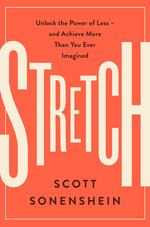 Stretch: Unlock the Power of Less -and Achieve More Than You Ever Imagined by Scott Sonenshein, Harper Business
Stretch: Unlock the Power of Less -and Achieve More Than You Ever Imagined by Scott Sonenshein, Harper Business
A Rice social scientist teaches you to rethink what you need to succeed, and do more with what you already have, in this counterintuitive, evidence-based guide to changing the way you work and live.
Stretch identifies key ways for people and organizations to work beyond their resources to achieve higher performance. Based on in-depth research in psychology and management, Scott Sonenshein shows how to accomplish goals, find professional and personal success, and live a richer life.
Two different mindsets drive achievement, creativity, and innovation: “stretching” and “chasing.” Stretchers embrace what they have, finding unconventional ways to use resources already at hand. A coat hanger is a surgical tool; a competitor is someone who improves your own work. Chasers get trapped in convention. They mindlessly accept other people’s definitions of resources and often feel they are missing what they need to succeed. Sonenshein teaches a four-part framework that activates the stretching potential we all have but may not fully recognize.
- Diversify experiences.
- Act immediately without overplanning.
- Expect the positive.
- Build unique combinations.
Sonenshein reveals that while we rarely have all we think we need, we usually have more than we imagine. Whether leading organizations, launching careers, or raising families, Stretch teaches us how to achieve more by acting resourcefully at work and beyond.
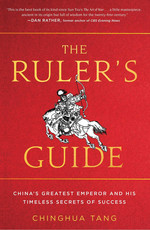 The Ruler's Guide: China’s Greatest Emperor and His Timeless Secrets of Success by Chinghua Tang, Scribner
The Ruler's Guide: China’s Greatest Emperor and His Timeless Secrets of Success by Chinghua Tang, Scribner
In the classic tradition of Sun Tzu’s The Art of War, here for the first time in English is the timeless wisdom of China’s greatest emperor Tang Taizong (598-649 AD), which is still being studied more than 1300 years later as an invaluable guide to leading and managing.
Tang Taizong is arguably the greatest Emperor in Chinese history. In Asia, many historians rank him with such rulers as Augustus, Genghis Khan, and Napoleon. When he founded the Tang dynasty, Taizong was only twenty-eight years old, and his chief accomplishments were on the battlefield, where he personally slew 1,000 of the enemy. Ultimately, he would defeat the descendants of Attila the Hun, open up the Silk Road trading route, create a golden age of prosperity and cosmopolitan culture, preside over a society in which women enjoyed higher status, and allow Christianity and Islam into China for the first time as well as introduce Buddhism into Tibet. His dynasty would last 300 years.
Here, author Chinghua Tang presents conversations between Taizong and his gifted advisers that reveal core aspects of leadership, among them: how to appraise oneself and assess others, how to enhance organizational effectiveness, how to compete with rivals, how to grow power and influence without losing the respect of others, how to learn from the rise and fall of predecessors, and how to craft one’s legacy.
An indispensable guide that is as relevant for a middle-manager, military commander, or athletic coach as for a school principal, political leader, or over-stressed parent, The Ruler’s Guide doesn’t just reveal the insights that have kept Taizong’s legacy alive, it spells out how that wisdom is a match for today’s fast-paced, ever changing world.
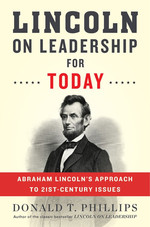 Lincoln on Leadership for Today: Abraham Lincoln’s Approach to Twenty-First-Century Issues by Donald T. Phillips, Houghton Mifflin Harcourt
Lincoln on Leadership for Today: Abraham Lincoln’s Approach to Twenty-First-Century Issues by Donald T. Phillips, Houghton Mifflin Harcourt
The author of the classic bestseller Lincoln on Leadership answers the question: How would President Lincoln handle the pressing crises of our modern world?
Abraham Lincoln is recognized as one of history's finest leaders, a great president when the United States was under tremendous strain. But suppose he were alive today? How would Lincoln deal with today’s high-pressure issues, from politics to business?
Based on a lifelong study of Lincoln’s life, writings, and speeches, best-selling author Donald T. Phillips offers compelling ideas on how Lincoln would employ his exemplary leadership and executive style.
How would Lincoln handle today's frayed race relations, terrorism at home and abroad, gun control, and the influence of special interest groups on Congress? What would have been Lincoln's reaction to the invasion of Iraq? How would he have handled the Great Recession? What would be his stance on science and climate change? How did Lincoln feel about government entitlement programs? Would he have them at all? How would he feel about the growing gap between the haves and the have-nots, a worker's right to strike, the minimum wage, and labor unions? Would Lincoln have a mobile phone and embrace the whirl of social media?
Phillips hews very closely to Lincoln’s extensive writings and records to offer a fascinating look at how we might solve some of our most challenging problems, Lincoln-style.
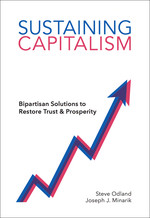 Sustaining Capitalism: Bipartisan Solutions to Restore Trust & Prosperity by Steve Odland & Joseph J. Minarik
Sustaining Capitalism: Bipartisan Solutions to Restore Trust & Prosperity by Steve Odland & Joseph J. Minarik
Today, amidst the crisis of confidence in business and our economic system, Steve Odland and Joe Minarik lay out a clear plan for how business and policy leaders can generate prosperity for all, and make capitalism sustainable for generations to come.
Making capitalism work for all Americans requires bold leadership from beyond the policy community. It is America's business leaders who have the needed experience on the front lines of the economy to help course-correct our economic system. Yet for too long, too many have stayed on the sidelines and avoided the public square. What are the current threats to capitalism? And how can they address these challenges in a polarized political environment? Look no further than Sustaining Capitalism: Bipartisan Solutions to Restore Trust & Prosperity.
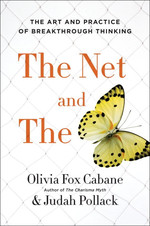 The Net and the Butterfly: The Art and Practice of Breakthrough Thinking by Olivia Fox Cabane & Judah Pollack, Portfolio
The Net and the Butterfly: The Art and Practice of Breakthrough Thinking by Olivia Fox Cabane & Judah Pollack, Portfolio
In The Charisma Myth, Olivia Fox Cabane offered a groundbreaking approach to becoming more charismatic. Now she teams up with Judah Pollack to reveal how anyone can train their brain to have more eureka insights.
The creative mode in your brain is like a butterfly. It’s beautiful and erratic, hard to catch and highly valued as a result. If you want to capture it, you need a net. Enter the executive mode, the task-oriented network in your brain that help you tie your shoes, run a meeting, or pitch a client. To succeed, you need both modes to work together—your inner butterfly to be active and free, but your inner net to be ready to spring at the right time and create that “aha!” moment. But is there any way to trigger these insights, beyond dumb luck?
Thanks to recent neuroscience discoveries, we can now explain these breakthrough moments—and also induce them through a series of specific practices. It turns out there’s a hidden pattern to all these seemingly random breakthrough ideas. From Archimedes’ iconic moment in the bathtub to designer Adam Cheyer’s idea for Siri, accidental breakthroughs throughout history share a common origin story. In this book, you will learn to master the skills that will transform your brain into a consistent generator of insights.
Drawing on their extensive coaching and training practice with top Silicon Valley firms, Cabane and Pollack provide a step-by-step process for accessing the part of the brain that produces breakthroughs and systematically removing internal blocks. Their tactics range from simple to zany, such as:
- Imagine an alternate universe where gravity doesn’t exist, and the social and legal rules that govern it.
- Map Disney’s Pocahontas story onto James Cameron’s Avatar.
- Rid yourself of imposter syndrome through mental exercises.
- Literally change your perspective by climbing a tree.
- Stimulate your butterfly mode by watching a foreign film without subtitles.
By trying the exercises in this book, readers will emerge with a powerful new capacity for breakthrough thinking.
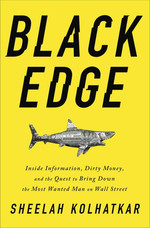 Black Edge: Inside Information, Dirty Money, and the Quest to Bring Down the Most Wanted Man on Wall Street by Sheelah Kolhatkar, Random House
Black Edge: Inside Information, Dirty Money, and the Quest to Bring Down the Most Wanted Man on Wall Street by Sheelah Kolhatkar, Random House
The deeply reported story of Steven Cohen and the rise and fall of his legendary hedge fund SAC Capital, and the FBI agents, prosecutors and SEC lawyers who led the largest insider trading investigation in the history of Wall Street.
Steven A. Cohen is a Wall Street legend. Born into a middle class family in an affluent Long Island town, he longed from an early age to be a star on Wall Street. He went to Wharton, and in 1992 launched the hedge fund SAC Capital, which he built into a $15 billion empire, almost entirely on the basis of his wizard-like stock trading. He cultivated an air of mystery, reclusiveness, and extreme excess, building a 35,000 square foot house in Greenwich, flying to work by helicopter, and amassing one of the largest private art collections in the world. On Wall Street, he was revered as a genius: one of the greatest traders who ever lived. That public image was shattered when SAC Capital became the target of a sprawling, seven-year criminal and SEC investigation, the largest in history, led by an under-recognized but determined group of FBI agents, prosecutors, and SEC investigators. Labeled by prosecutors as a “magnet for market cheaters” whose culture encouraged relentless pursuit of an information “edge”—and even “black edge” (inside information)—SAC Capital was ultimately indicted and pled guilty to charges of securities and wire fraud in connection with a large-scale insider trading scheme. Cohen’s company paid record criminal and civil fines of nearly $2 billion and Cohen was forced to stop managing other people’s money. But as Kolhatkar shows, even as the company bearing his initials plead guilty, Cohen was never actually put out of business. He was allowed to keep trading his own $10 billion fortune (in 2014, he made over $2 billion in profit), and can start a new hedge fund in only a few years. Though his company and several of his employees were convicted or plead guilty to insider trading, Cohen himself walked away a free man. This is a riveting, true-life thriller that raises an urgent and troubling question: Are Wall Street titans like Cohen above the law?
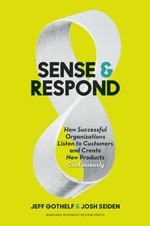 Sense and Respond: How Successful Organizations Listen to Customers and Create New Products Continuously by Jeff Gothelf, Josh Seiden, Harvard Business Review Press
Sense and Respond: How Successful Organizations Listen to Customers and Create New Products Continuously by Jeff Gothelf, Josh Seiden, Harvard Business Review Press
The End of Assembly Line Management.
We’re in the midst of a revolution. Quantum leaps in technology are enabling organizations to observe and measure people’s behavior in real time, communicate internally at extraordinary speed, and innovate continuously. These new, software-driven technologies are transforming the way companies interact with their customers, employees, and other stakeholders.
This is no mere tech issue. The transformation requires a complete rethinking of the way we organize and manage work. And, as software becomes ever more integrated into every product and service, making this big shift is quickly becoming the key operational challenge for businesses of all kinds. We need a management model that doesn’t merely account for, but actually embraces, continuous change. Yet the truth is, most organizations continue to rely on outmoded, industrial-era operational models. They structure their teams, manage their people, and evolve their organizational cultures the way they always have.
Now, organizations are emerging, and thriving, based on their capacity to sense and respond instantly to customer and employee behaviors. In Sense and Respond, Jeff Gothelf and Josh Seiden, leading tech experts and founders of the global Lean UX movement, vividly show how these companies operate, highlighting the new mindset and skills needed to lead and manage them—and to continuously innovate within them.
In illuminating and instructive business examples, you’ll see organizations with distinctively new operating principles: shifting from managing outputs to what the authors call “outcome-focused management”; forming self-guided teams that can read and react to a fast-changing environment; creating a learning-all-the-time culture that can understand and respond to new customer behaviors and the data they generate; and finally, developing in everyone at the company the new universal skills of customer listening, assessment, and response.
This engaging and practical book provides the crucial new operational and management model to help you and your organization win in a world of continuous change.
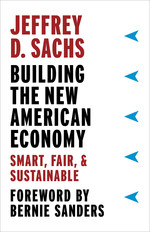 Building the New American Economy: Smart, Fair, and Sustainable by Jeffrey D. Sachs, Columbia University Press
Building the New American Economy: Smart, Fair, and Sustainable by Jeffrey D. Sachs, Columbia University Press
In this passionate and powerful book-part manifesto, part plan of action-the renowned economist Jeffrey D. Sachs offers a practical strategy to move America, seemingly more divided than ever, toward a new consensus: sustainable development.
Sustainable development is a holistic approach that emphasizes economic, social, and environmental objectives in shaping policy. In focusing too much on economic growth, the United States has neglected rising economic inequality and dire environmental threats. Now, even growth is imperiled.
Sachs explores issues that have captivated the nation and political debate, including infrastructure, trade deals, energy policy, the proper size and role of government, the national debt, and income inequality. Not only does he provide illuminating and accessible explanations of the forces at work in each case, but he also presents specific policy solutions. His argument rises above the pessimism born of political paralysis, economic stagnation, and partisanship to devise a brighter way forward, achievable both individually and collectively. In Building the New American Economy, Sachs shows how the United States can find a path to renewed economic progress that is fair and environmentally sustainable.
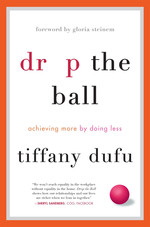 Drop the Ball: Achieving More by Doing Less by Tiffany Dufu, Flatiron Books
Drop the Ball: Achieving More by Doing Less by Tiffany Dufu, Flatiron Books
A bold and inspiring memoir and manifesto from a renowned voice in the women's leadership movement who shows women how to cultivate the single skill they really need in order to thrive: the ability to let go.
Once the poster girl for doing it all, after she had her first child, Tiffany Dufu struggled to accomplish everything she thought she needed to in order to succeed. Like so many driven and talented women who have been brought up to believe that to have it all, they must do it all, Dufu began to feel that achieving her career and personal goals was an impossibility. Eventually, she discovered the solution: letting go. In Drop the Ball, Dufu recounts how she learned to reevaluate expectations, shrink her to-do list, and meaningfully engage the assistance of others—freeing the space she needed to flourish at work and to develop deeper, more meaningful relationships at home.
Even though women are half the workforce, they still represent only eighteen per cent of the highest level leaders. The reasons are obvious: just as women reach middle management they are also starting families. Mounting responsibilities at work and home leave them with no bandwidth to do what will most lead to their success. Offering new perspective on why the women’s leadership movement has stalled, and packed with actionable advice, Tiffany Dufu’s Drop the Ball urges women to embrace imperfection, to expect less of themselves and more from others—only then can they focus on what they truly care about, devote the necessary energy to achieving their real goals, and create the type of rich, rewarding life we all desire.
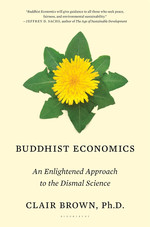 Buddhist Economics: An Enlightened Approach to the Dismal Science by Clair Brown, Bloomsbury Press
Buddhist Economics: An Enlightened Approach to the Dismal Science by Clair Brown, Bloomsbury Press
In the tradition of E. F. Schumacher’s Small Is Beautiful, renowned economist Clair Brown argues persuasively for a new economics built upon equality, sustainability, and right living.
Traditional economics measures the ways in which we spend our income, and doesn’t attribute worth to the crucial human interactions that give our lives meaning.
Clair Brown, an economist at UC Berkeley and a practicing Buddhist, has developed a holistic model, one based on the notion that quality of life should be measured by more than national income. Brown advocates an approach to organizing the economy that embraces, rather than skirts, questions of values, sustainability, and inequality. Complementing the award-winning work of Paul Krugman and Jeffrey Sachs, and the paradigm-breaking spirit of Thomas Piketty and Amartya Sen, Brown incorporates the Buddhist emphasis on interconnectedness, capability, and happiness into her vision for a sustainable and compassionate world.
Buddhist economics leads us to think mindfully as we go about our daily activities, and offers a way to appreciate how our actions affect the welfare of those around us. By replacing the endless cycle of desire with more positive collective priorities, our lives can become more meaningful as well as happier. Inspired by the popular seminar course Brown developed for UC Berkeley that has garnered international attention, Buddhist Economics represents an enlightened approach to our modern world infused with ancient wisdom, with benefits both personal and global, for generations to come.
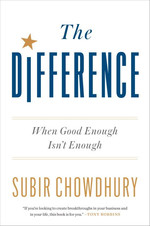 The Difference: When Good Enough Isn't Enough by Subir Chowdhury, Crown Business
The Difference: When Good Enough Isn't Enough by Subir Chowdhury, Crown Business
As Subir Chowdhury makes clear, while improving a company’s processes is vital, if you don’t focus first on your people—your employees—the best processes in the world won’t get you where you want to go.
In the bestselling tradition of The Fred Factor and What the CEO Wants You to Know, bestselling author and quality guru Subir Chowdhury (The Power of Six Sigma), tackles a question that has haunted him in his consulting work with companies for years. Why is it that some companies improve 50x, while others improve only incrementally. The ideas and training, after all, are the same. What is the difference? That is the question he tackles in this compelling and empowering new book.
In The Difference, Subir Chowdhury looks at what distinguishes a company that adopts his quality training processes, and improves 5x, versus a company that adopts the same training and consulting, but increases their profits and quality 50x. The difference, he claims, in this short, engaging, and insightful book, is the people in your workplace, on your staff, in your executive offices. The best processes and training programs in the world will not lead to world-class operations, unless a company first looks to the people who make up their workforce. Only by creating a “caring mind-set”—a culture built upon straightforwardness, honesty, and openness; a management structure that thinks about the concerns of their people; a workplace that inspires accountability and engagement; and managers and employees who tackle the challenges they face with perseverance and resolve, can companies flourish and excel.
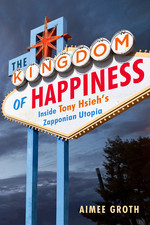 The Kingdom of Happiness: Inside Tony Hsieh’s Zapponian Utopia by Aimee Groth, Touchstone
The Kingdom of Happiness: Inside Tony Hsieh’s Zapponian Utopia by Aimee Groth, Touchstone
Fearless gonzo journalism—an insider’s look at the enigmatic and successful CEO of Zappos, Tony Hsieh, and his quest to create his own version of utopia in the center of Las Vegas.
In 2010 Tony Hsieh was introduced to many as a visionary modern business leader. Under Hsieh’s leadership, Zappos became the world’s largest online shoe company by championing satisfied customers and a valued workforce. After his company was purchased by Amazon, even as he continued as its CEO, Hsieh engaged his energies and considerable fortune toward a much larger goal: building a new and more socially conscious Silicon Valley in the heart of downtown Las Vegas, all within his five-year plan.
Hsieh challenged business and technology journalist Aimee Groth to uproot her life and participate in his social engineering experiment. Beginning with couch surfing, moving to a Downtown Project crash pad, and then living in Zappos corporate housing above the Gold Spike bar, Groth had a front-row view of Hsieh’s efforts to build his ideal society.
With interviews from insiders on all ends of the Zappos spectrum—like the “broken dolls” who gravitate toward Hsieh’s almost cultlike personality and make up some of his inner circle, to the Zapponians who live and work on campus, to players in the top echelon of Silicon Valley—Groth offers a unique view of a world few people know much about, and sheds a new light on this complex, eccentric man.
The Kingdom of Happiness is the story of one man’s quest to create his own nirvana in the desert based on his exacting design and experimentation with lessons he’s gleaned not only from the incredible success of Zappos, but also from rave culture and Burning Man. Is it the business model of the future or a cautionary tale of hubris?
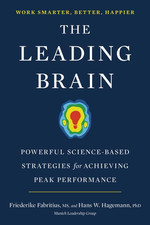 The Leading Brain: Powerful Science-Based Strategies for Achieving Peak Performance by Friederike Fabritius, Hans W. Hagemann, TarcherPerigee
The Leading Brain: Powerful Science-Based Strategies for Achieving Peak Performance by Friederike Fabritius, Hans W. Hagemann, TarcherPerigee
A cutting-edge guide to applying the latest research in brain science to leadership—to sharpen performance, encourage innovation, and enhance job satisfaction.
There’s a revolution taking place that most businesses are still unaware of. The understanding of how our brains work has radically shifted, exploding long-held myths about our everyday cognitive performance and fundamentally changing the way we engage and succeed in the workplace.
Combining their expertise in both neuropsychology and management consulting, neuropsychologist Friederike Fabritius and leadership expert Dr. Hans W. Hagemann present simple yet powerful strategies for:
- Sharpening focus
- Achieving the highest performance
- Learning and retaining information more efficiently
- Improving complex decision-making
- Cultivating trust and building strong teams
Based on the authors’ popular leadership programs, which have been delivered to tens of thousands of leaders all over the world, this clear, insightful, and engaging book will help both individuals and teams perform at their maximum potential, delivering extraordinary results. Learn more at www.fabulous-brain.com.
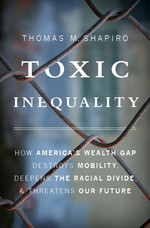 Toxic Inequality: How America?s Wealth Gap Destroys Mobility, Deepens the Racial Divide, and Threatens Our Future by Thomas M. Shapiro, Basic Books
Toxic Inequality: How America?s Wealth Gap Destroys Mobility, Deepens the Racial Divide, and Threatens Our Future by Thomas M. Shapiro, Basic Books
From a leading authority on race and public policy, a deeply researched account of how families rise and fall today.
Since the Great Recession, most Americans' standard of living has stagnated or declined. Economic inequality is at historic highs. But inequality's impact differs by race; African Americans' net wealth is just a tenth that of white Americans, and over recent decades, white families have accumulated wealth at three times the rate of black families. In our increasingly diverse nation, sociologist Thomas M. Shapiro argues, wealth disparities must be understood in tandem with racial inequities-a dangerous combination he terms "toxic inequality."
In Toxic Inequality, Shapiro reveals how these forces combine to trap families in place. Following nearly two hundred families of different races and income levels over a period of twelve years, Shapiro's research vividly documents the recession's toll on parents and children, the ways families use assets to manage crises and create opportunities, and the real reasons some families build wealth while others struggle in poverty. The structure of our neighborhoods, workplaces, and tax code-much more than individual choices-push some forward and hold others back. A lack of assets, far more common in families of color, can often ruin parents' careful plans for themselves and their children.
Toxic inequality may seem inexorable, but it is not inevitable. America's growing wealth gap and its yawning racial divide have been forged by history and preserved by policy, and only bold, race-conscious reforms can move us toward a more just society.
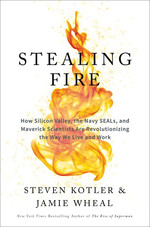 Stealing Fire: How Silicon Valley, the Navy SEALs, and Maverick Scientists Are Revolutionizing the Way We Live and Work by Steven Kotler & Jamie Wheal, Dey Street Books
Stealing Fire: How Silicon Valley, the Navy SEALs, and Maverick Scientists Are Revolutionizing the Way We Live and Work by Steven Kotler & Jamie Wheal, Dey Street Books
The author of Bold and The Rise of Superman explores altered states of consciousness and how they can ignite passion, fuel creativity, and accelerate problem solving, in this groundbreaking book in the vein of Daniel Pink’s Drive and Charles Duhigg’s Smarter Faster Better.
Why has generating “flow” and getting “into the zone” become the goal of the world’s most elite organizations? Why are business moguls attending Burning Man? Why has meditation become a billion dollar industry? Why are technology gurus turning to psychedelic drugs to unlock creativity?
All of these people are seeking to shift their state of mind as a way of unlocking their true potential. Altered states, the authors reveal, sharpen our decision making capabilities, unleash creativity, fuel cooperation, and let us tap into levels of inspiration and innovation unavailable at all other times. Stealing Fire combines cutting-edge research and first-hand reporting to explore a revolution in human performance—a movement millions of people strong to harness and utilize some of the most misunderstood and controversial experiences in history.
Building a bridge between the extreme and the mainstream, this groundbreaking and provocative book examines how the world’s top performers–the Navy SEALS, Googlers, Fortune 100 CEOs—are using altered states to radically accelerate performance and massively improve their lives, and how we can too.
Ultimately, Stealing Fire is a book about profound possibility—about what is actually possible for ourselves and our species when we unlock the full potential of the human mind.

